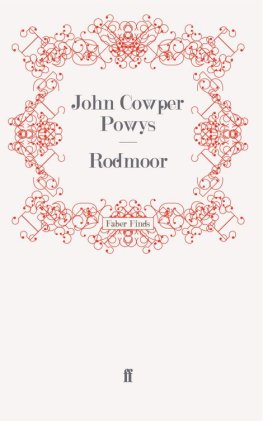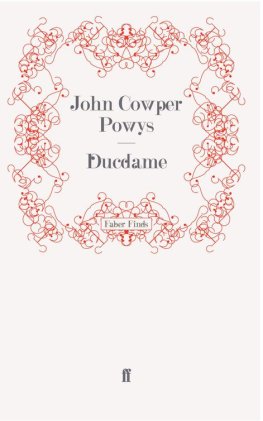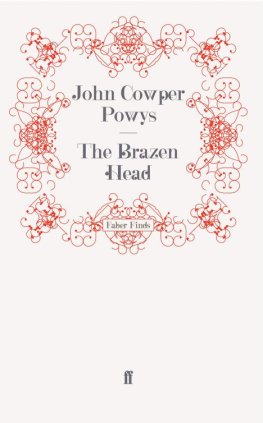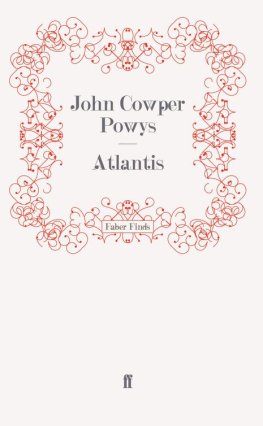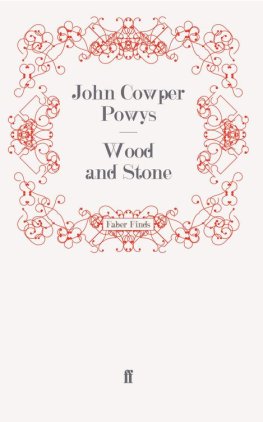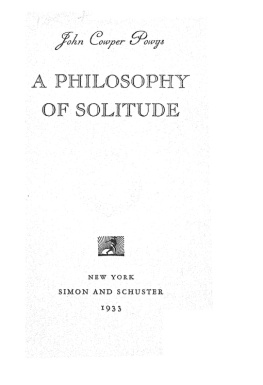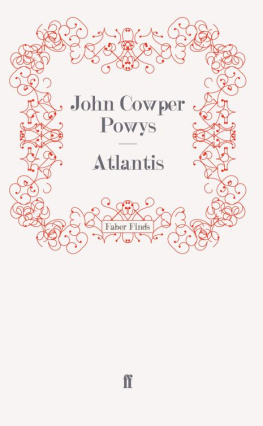DEDICATED TO THE SPIRIT OF EMILY BRONTE
O they rade on, and farther on,
And they waded rivers abune the knee.
And they saw neither sun nor moon
But they heard the roaring of the sea
ANONYMOUS
POWYS is rather like Shakespeare in that his early work shows no faltering, but springs out, like the birth of Athene, ready-armed. Rodmoor was his second novel, and the only one that has never been published in England. It has nevertheless a quality all its own. It is a strange book, but grips the reader, holding him with a keen suspense. It is the most dramatic of all Powyss books.
I have called it strange. The hero, Adrian Sorio, has been in a mental home and is engaged in writing on destruction as the key to existence; a theme to be taken up again, with differences, in Powyss next story, Ducdame, and, much later, in The Inmates. These rather mind-staggering simplicities mean much in Powys. He is fascinated by the phenomenal universe and also by the strange possibility of a universe composed of not-being, perhaps of what we today would call anti-matter. His last published work was, with exact purpose, entitled All or Nothing.
In human affairs, this poses the question of life and death. What is death? In The Art of Happiness Powys says that we should enjoy the prospect of death and alters Wordsworths famous line (Michael 77) to read, the pleasure which there is in life and death. We should enjoy the prospect of not-being, rather as we enjoy a dreamless sleep. The more, however, that we think of such blissful not-being the more it assumes a positive quality, like the Nirvana of Buddhist philosophy. Throughout Powyss life-work this problem, in various forms, continues to teaze. The gist of it all is, rather amazingly, already perfectly expressed in Rodmoor. Here we are told that there is something beyond the point where every living thing ceases to exist and becomes nothing. It is as a blinding white light that is yet neither light nor darkness. All normal terms are inadequate except one: here Adrian will be reunited with his idealised son, the seraphic Baptiste.
It is natural that so strange a story should have human figures that are also strange. Our story is set by the sea, in East Anglia, the only Powys novel with the exception of the opening chapters of A Glastonbury Romanceto be so located. Here the sea is, or seems, fearful, a threat, almost malignant. Of the people, Brand Renshaw is a Gothic monster of dark, mysterious, evil. The girl Philippa is an elfin creation at home with the elements and bisexually conceived. True, we have on the other side the wise Mrs Renshaw and the faithful Nance who stand for sanity as normally understood, but the balance favours the strange ones and is preceded by a vision of an ambisexual figure seeking amid the dreams of all the great perverted artists of the world for the incarnation it has been denied by the will of God.
The hero all but ends with Philippa, but drawn on by his visionary Nirvana he leaves her for the sea, now blessed part of a serene infinitude, and after the exultant cry Baptiste!, he dies.
G. Wilson Knight
1973
IT was not that he concealed anything from her.
He told her quite frankly, in that first real conversation they had together on the little secluded bench in the South London park about all the morbid sufferings of his years in America and his final mental collapse.
He even indicated to her while the sound of grass-mowing came to them over the rain-wet tulips some of the most secret causes of this event; his savage reaction, for instance, against the circle he was thrown into there; his unhappy habit of deadly introspection; his aching nostalgia for things less murderously new and raw.
He explained how his mental illness had taken so dangerous, so unlooked for a shape, that it was only by the merest chance he had escaped long incarceration.
No; it was not that he concealed anything. It was rather that she experienced a remote uneasy feeling that, say what he might, and in a certain sense he said too much rather than too little she did not really understand him.
Her feminine instinct led her to persuade him that she understood; led her to say what was most reassuing to him, and most consolatory; but in her heart of hearts she harboured a teasing doubt; a doubt which only the rare sweetness of these first love-days of her life enabled her to hide and cover over. Nor was this feeling about her lovers confessions the only little cloud on Nance Herricks horizon during these memorable weeks weeks that, after all, she was destined to look back upon as so strangely happy.
She found herself, in the few moments when her passionate emotion left her free to think of such things, much more anxious than she cared to admit about the ambiguous relations existing between the two persons dependent upon her. Ever since the death of her father that prodigal sailor three years ago, when she had taken it upon herself to support both of them by her work in the dressmakers shop, she had known that all was not well between the two. Rachel Doorm had never forgiven Captain Herrick for marrying again; she felt that instinctively, but it was only quite recently that she had grown to be really troubled by the eccentric womans attitude to the little half-sister.
Lindas mother, she knew, had in her long nervous decline rather clung than otherwise to this grim friend of the former wife; but Lindas mother had always been different from other women; and Nance could remember how, in quite early days, she never interfered when Miss Doorm took the child away to punish her.
To Nance herself Rachel had always been something of an anxiety. Her savage devotion had proved over and over again more of a burden than a pleasure; and now that there was this increased tension between her and Linda, the thing began to appear invidious, rapacious, sinister.
She was torn, in fact, two ways over the situation. Her own mother had long ago and it was one of her few definite recollections of her made her swear solemnly never to desert this friend of former days; and the vows she had registered then to obey this covenant had grown into a kind of religious rite; the only rite, in fact, after all these years, she was able to perform for her dead.
And yet if loyalty to her mother kept her patiently tender with Rachels eccentricities, the much warmer feeling she had for her other parent was stirred indignantly by the thought of any unkindness dealt out to Linda.
And just at present, it was clear, Linda was not happy.
The young girl seemed to be losing her vivacity and to be growing silent and reserved.
She was now nearly eighteen; and yet Nance had caught her once or twice lately looking at Rachel Doorm with the same expression of frightened entreaty as she used to wear when led away from her mothers side for some childish fault. Rachels father, a taciturn and loveless old man, had recently died, leaving his daughter, whom he had practically cast off, a small but secure annuity and a little house on the east coast.
It was now to this home of her ancestors, in the village of Rodmoor, that Rachel Doorm was anxious to transport both sisters; partly as a return for what Nances mother, and more recently Nance herself, had done for her support, and partly out of fanatical devotion to Nance.
The girl could not help experiencing a feeling of infinite relief at the thought of being freed from her uncongenial work in the dressmakers establishment. Her pleasure, nevertheless, had been considerably marred, in the last few days, by the attitude of her sister towards the projected change.
And now, with the realisation of this thrilling new passion possessing her, her own feeling about leaving London was different from what it had been at first.

